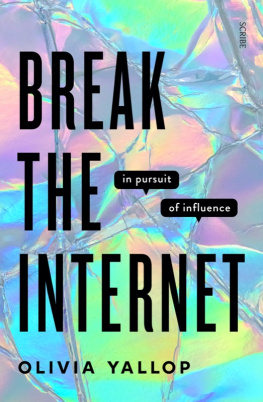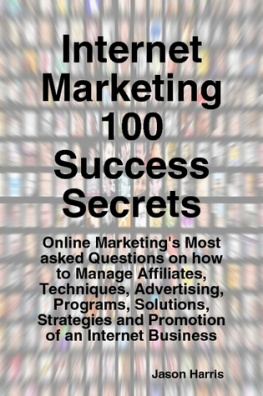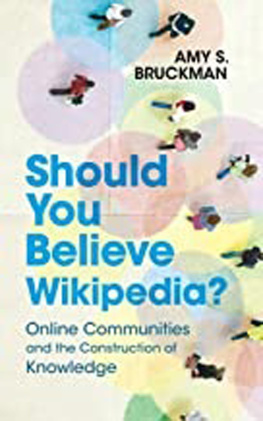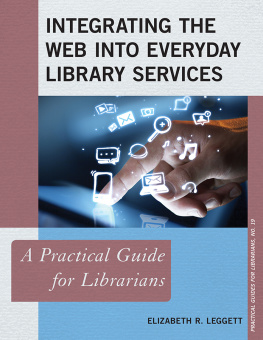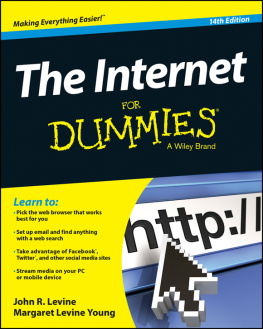The Twenty-Six Words That Created the Internet
Jeff Kosseff
Cornell University Press
Ithaca and London
This book is dedicated to Judges Leonie M. Brinkema and Milan D. Smith Jr. Working for them was the greatest privilege of my career, and they taught me how to love the law, even if I didnt always agree with it.
Contents
Acknowledgments
Thanks to the many lawyers, litigants, scholars, and others who spoke with me for this book.
It was particularly difficult to track down documents and information from many cases in the 1990s and early 2000s, and I greatly appreciate all who helped me as I researched and wrote the book, providing me with old case files and leads and serving as sounding boards for my many thoughts and questions about Section 230. Special thanks to Timothy Alger, Jerry Berman, Chris Brancart, Bill Burrington, Bob Butler, Pat Carome, Danielle Citron, Sophia Cope, Lydia de la Torre, Dennis Devey, Brant Ford, Leo Kayser, Jeannine Kenney, Mary Leary, Alex Levy, Paul Levy, Stephen Rohde, Peter Romer-Friedman, Barbara Wall, and Kurt Wimmer.
I am particularly grateful to Brian Frye, Mike Godwin, Eric Goldman, Bob Hamilton, and Daphne Keller for their thorough reviews of the manuscript and immensely helpful comments.
Thanks to Emily Andrew and her colleagues at Cornell University Press for seeing the potential in a book about twenty-six words in an arcane federal law and for providing absolutely essential assistance in shaping the book over more than a year. Thanks to Karen Laun and Romaine Perin for meticulous editing, and to Liz Seif for outstanding cite-checking.
As always, I am eternally thankful to my family, especially Crystal Zeh, Julia, Chris, and Betty Kosseff, and Eileen Peck for their tireless support.
I am indebted to my colleagues and midshipmen at the United States Naval Academy (Hooyah!) for taking the time to talk through the legal, moral, and ethical complexities of Section 230. All views expressed in this book are only mine and do not represent those of the Naval Academy, Department of Navy, or Department of Defense. This book is not intended to be legal advice and is not a substitute for guidance from a lawyer.
Many of the legal disputes in this book arise from offensive, inappropriate, and vulgar content. It is important to publish the unedited words to allow the reader to assess the full scope of the harms suffered by victims. For filings from many of the cases discussed in this book and updates about Section 230, visit jeffkosseff.com.
Introduction
During my service in the United States Congress,
I took the initiative in creating the Internet.
So said Al Gore in a March 9, 1999, broadcast on CNN, as the vice president prepared to launch his presidential bid. That sentence was one of many factors that would contribute to his electoral college loss to George W. Bush the following year. The phrase Al Gore invented the Internet became a frequent late-night talk show joke (even though Gore had said creating and not inventing). His political opponents pointed to the CNN interview as evidence of his being a liar or, at the very least, a master-class exaggerator. After all, how could a member of Congress single-handedly create the Internet? Since the 2000 election, history has been kinder to Gore. Some commentators have since noted that Gore did, in fact, take the lead on a 1991 bill that funded new technology and allowed the private sector to develop networked computing technology that the Defense Department had been developing for decades. Gore was not crazy to suggest that Congress was responsible for creating the Internetat least, the Internet as we know it today. The dynamic, communal, and vicious public square exists because of one federal law.
But this law wasnt born from the bill that Gore sponsored. Twenty-six words in an entirely different federal statute have created the modern Internet:
No provider or user of an interactive computer service shall be treated as the publisher or speaker of any information provided by another information content provider.
Those words are part of Section 230 of the Communications Decency Act of 1996, written by an odd pairing of congressmen: California Republican Chris Cox and Oregon Democrat Ron Wyden. The twenty-six words would come to mean that, with few exceptions, websites and Internet service providers are not liable for the comments, pictures, and videos that their users and subscribers post, no matter how vile or damaging. The services retain this broad immunity even if they edit or delete some user content. As the name of the law suggests, Cox and Wyden, working with technology companies and civil liberties groups, wrote the bill hoping to encourage early online services such as America Online and Prodigy to moderate pornography, filthy jokes, violent stories, and other words and images that could harm children.
Section 230 was a direct and swift response to a Long Island, New York, state court judges 1995 ruling against Prodigy, then the largest online service in the United States. Relying on a tangled web of First Amendment decisions dating to the 1950s, the judge ruled that because Prodigy moderated some content and established online community policies, and it failed to delete posts that allegedly defamed the plaintiff, Prodigy could be sued for those posts regardless of whether it knew of them. Had Prodigy taken an entirely hands-off approach to its users posts, the First Amendment might have protected it from the lawsuit. This court opinion stirred concerns that online services would not set family-friendly guidelines, fearing being sued into oblivion. By immunizing all online services from lawsuits over materials that their users upload, Cox and Wyden hoped to encourage the companies to feel free to adopt basic conduct codes and delete material that the companies believe is inappropriate.
But there was another reason that Cox and Wyden provided such sweeping immunity. They both recognized that the Internet had the potential to create a new industry. Section 230, they hoped, would allow technology companies to freely innovate and create open platforms for user content. Shielding Internet companies from regulation and lawsuits would encourage investment and growth, they thought.
The bills proposal and passage flew under the radar. Section 230 received virtually no opposition or media coverage, as it was folded into the more controversial Communications Decency Act, which was added to the Telecommunications Act of 1996, a sweeping overhaul of U.S. telecommunications laws. Beltway media and lobbyists focused on the regulation of long-distance carriers, local phone companies, and cable providers, believing that these companies would shape the future of communications. What most failed to anticipate was that online platformssuch as websites, social media companies, and appswould play a far greater role in shaping the future of the Internet than would the cables and wires that physically connected computers. Section 230 addressed a tiny niche that few outside the technology policy world paid much attention to in 1995.
Even Cox and Wyden had little inkling of the Internet that Section 230 would create. Only forty million people worldwide had any Internet access, a tiny sliver of the more than three billion today. Many companies did not even have websites, and even fewer had viable plans to make money from the Internet. Apple would not introduce the first iPhone for more than a decade. Mark Zuckerberg was eleven years old. I always thought the bill was going to be useful, Wyden, now a U.S. senator, said, speaking in his Washington, D.C., office in 2017, but I never thought that its reach would be this dramatic.


